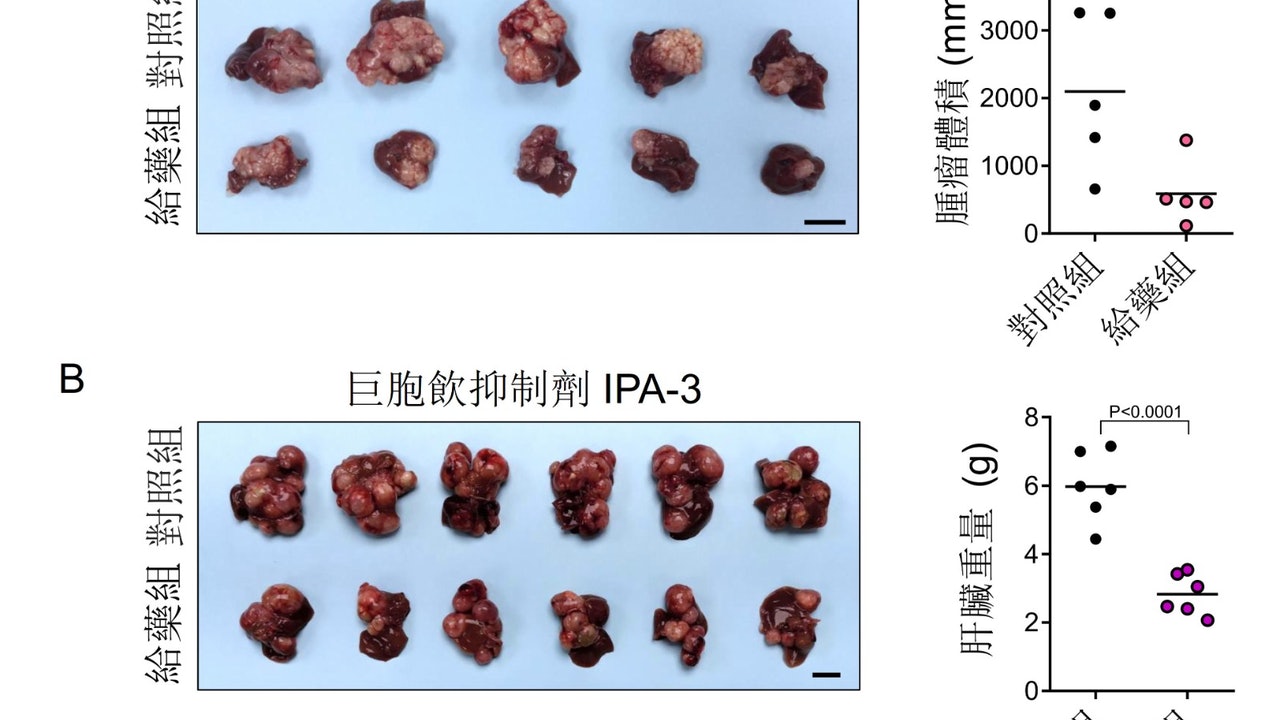A research team from the Department of Pathology, School of Clinical Medicine, Li Ka Shing Faculty of Medicine, The University of Hong Kong has discovered a metabolic pathway in liver cancer cells, in which liver cancer cells can utilize a process called macropinocytosis, which is fueled by phagocytosis of extracellular proteins. , to support the unlimited growth of liver cancer cells under hypoxic conditions, and the research results show that targeting the macropinocytosis pathway as a therapeutic direction may effectively inhibit liver cancer cells.
Both the hypoxia-inducible factor inhibitor Digoxin or the macropinocytosis inhibitor IPA-3 successfully inhibited tumor growth by more than 50% in a mouse hepatoma cell model.
(Provided by HKU Faculty of Medicine)
Liver cancer is the fifth most common cancer and the third most deadly cancer in Hong Kong, and hepatocellular carcinoma makes liver cancer cells highly adaptable and resistant to stress under hypoxic conditions by stabilizing a transcription factor called hypoxia-inducible factor-1.
The research team of the Faculty of Medicine of the University of Hong Kong discovered that a gene EHD2 regulated by hypoxia-inducible factor-1 can promote liver cancer cells to adapt to hypoxia and continue to grow through the metabolic program of macropinocytosis, and targeting the macropinocytosis pathway as a therapeutic direction, Or can effectively inhibit hepatocellular carcinoma.
Inhibition of macropinocytosis may be a feasible method for the treatment of hepatocellular carcinoma
The research team found in animal experiments that knocking out the EHD2 gene in mice can effectively inhibit the growth of hepatocellular carcinoma.
Hypoxia-inducible factor inhibitor Digoxin or macropinocytosis inhibitor IPA-3 both successfully inhibited tumor growth by more than 50% in mouse hepatocellular carcinoma cell models, and EHD2 gene was significantly overexpressed at least two times in about 40% of hepatocellular carcinoma patients Above, the research team believes that the study revealed a new metabolic pathway, that is, macropinocytosis mediated by hypoxia-inducible factor-1 or EHD2 would support the growth of hepatocellular carcinoma, so inhibition of macropinocytosis may be a treatment for hepatocellular carcinoma. feasible method.
Zelei Huang said that the research provides an important molecular basis for designing innovative cancer treatment strategies targeting macropinocytosis.
(Photo by Zhu Yunfei/File photo)
HKU Faculty of Medicine: Hope study applies to other cancers
Principal Investigator and Associate Professor of the Department of Pathology, School of Clinical Medicine, HKU Faculty of Medicine, Huang Zelei, said that the study found that the hypoxia-inducible factor-1 or EHD2 pathway promotes the ability of macropinocytosis-mediated metabolic reorganization in cancer, which provides a basis for the design of innovative cancers targeting macropinocytosis. The therapeutic strategy provides an important molecular basis, and since hypoxia is seen in all tumors, the research will be applicable to other cancers as well.
Prenetics, a testing company, introduced non-invasive detection technology for colorectal cancer. Only fecal samples were required. The fifth wave of the epidemic affected breast cancer services. Breast cancer foundation screening services fell by nearly 70%. Masquerade Mother's Day|A good mother with breast cancer reinfection relies on her family and the volunteers of the Breast Cancer Foundation to survive the difficulties

